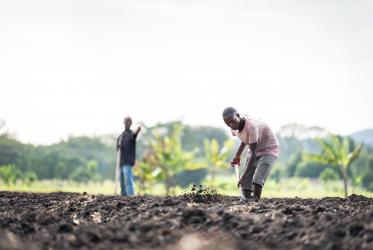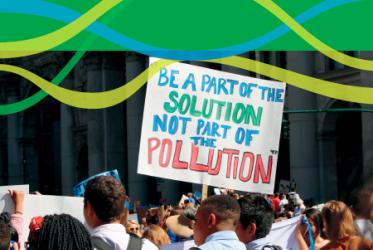And Jesus said to them, “Take care! Be on your guard against all kinds of greed; for one’s life does not consist in the abundance of possessions.” (Luke 12:15 NRSV)
1. The World Council of Churches (WCC) first articulated its concerns about finance and economics in 1984 when it issued a call for a new international order based on ethical principles and social justice. In 1998, the WCC assembly in Harare mandated a study on economic globalization together with member churches. WCC worked closely with the World Alliance of Reformed Churches, the Lutheran World Federation, Aprodev and other specialized ministries. Out of this, the Alternative Globalization Addressing People and earth (AGAPE) process, which was set up to further study the topics of poverty, wealth and ecology, was born. During the course of this process, several issues relating to various crises were identified: climate change and the food, social, and financial crises. In May 2009, the WCC convened a meeting of the Advisory Group on Economic Matters (AGEM) to (1) discern what is at stake in the current financial architecture, (2) propose a process that could lead to a new financial architecture and (3) outline the theological and ethical basis for such a new architecture.
2. Jesus warns that “You cannot serve both God and wealth” (Luke 16:13 NRSV). We, however, witness greed manifested dramatically in the financial and economic systems of our times. The current financial crisis presents an opportunity to re-examine our engagement and action. It is an opportunity for us to discern together how to devise a system that is not only sustainable but that is just and moral. Economics is a matter of faith and has an impact on human existence and all of creation.
3. The financial system of recent times has shaped the world more than ever before. However, by becoming the engine of virtual growth and wealth, it has enriched some people but has harmed many more, creating poverty, unemployment, hunger and death; widening the gap between rich and poor; marginalizing certain groups of people; eroding the whole meaning of human life; and destroying ecosystems. There is a growing and sobering awareness of our common vulnerability and of the limits of our current way of life. Today’s global financial crisis, which originated in the richest parts of our world, points to the immorality of a system that glorifies money and has a dehumanizing effect by encouraging acquisitive individualism. The resulting greed-based culture impoverishes human life, erodes the moral and ecological fabric of human civilization, and intoxicates our psyche with materialism. The crisis we face is, at the same time, both systemic and moral. Those most affected are: women, who bear a disproportionate share of the burden; young people and children, as doubts are raised and their sense of security for the future is eroded; and those living in poverty, whose suffering deepens.
4. In an era of financial globalization, economic expansion has been increasingly driven by greed. This greed, a hallmark of the current financial system, causes and intensifies the sacrifice and suffering of impoverished human beings, while the wealthy classes multiply their riches. Finance is, at best, the lubricant of real economic activities. However, we note that money is not wealth; it has no inherent value outside the human mind. When it is turned into a series of fictitious instruments to create ever more financial wealth it is increasingly divorcing itself from the real economy, thereby creating only virtual or phantom wealth that does not produce anything to meet real human needs.
5. The abuse of global finance and trade by international businesses costs developing countries more than $160 billion a year in lost tax revenues – undermining desperately needed public expenditures. Developing countries are lending their reserves to industrial countries at very low interest rates and are borrowing back at higher rates. This results in a net transfer of resources to reserve currency countries that exceed more than ten times the value of foreign assistance, according to the United Nations Development Programme (UNDP). This global financial crisis is proving the bankruptcy of the neoliberal doctrine, as promoted by the International Financial Institutions through the “Washington Consensus”. The leaders of the rich countries that had promoted the consensus so emphatically, declared it “over” at the G20 meeting in April 2009. And yet much of the G20’s agenda reflects misguided efforts to restore the same system of overexploitation of resources and unlimited growth. Furthermore, resources are channelled through the militarization of some societies, due to a perverse understanding of human security through military power.
6. Unfortunately, churches have also been complicit in this system, relying on popular models of finance and economics that prioritize generating money over the progress and well-being of humanity. These models are largely oblivious to the social and ecological costs of financial and economic decisions, and often lack moral direction. The challenge for churches today is to not retreat from their prophetic role. They are also challenged by their complicity with this speculative financial system and its embedded greed.
7. There are two structural elements of the current paradigm which must be changed. First, the economic motive of surplus value, unlimited growth and the irresponsible consumption of goods and natural resources contradict biblical values and make it impossible for societies to practice cooperation, compassion and love. Second, the system that privatizes productive goods and resources, disconnecting them from people’s work and needs and denying others access to and use of them is a structural obstacle to an economy of cooperation, sharing, love and dynamic harmony with nature. Alternative morality for economic activity is service/koinonia (fellowship) to human needs; human/social self-development; and people’s well being and happiness. An alternative to the current property system is connected to need, use and work invested in the production and distribution process. In order to achieve this goal, the existing organizing principles of production and claims settlements (i.e. distribution) must change. This also warrants a situation where an ethical, just and democratic global financial architecture emerges and is grounded on a framework of common values: honesty, social justice, human dignity, mutual accountability and ecological sustainability. It should also account for social and ecological risks in financial and economic calculation; reconnect finance to the real economy; and set clear limits to, as well as penalize, excessive and irresponsible actions based on greed.
8. It is in this context that the central committee of the WCC acknowledges that a new ethos and culture which reflects the values of solidarity, common good and inclusion must, at this time of crisis, emerge to replace the anti-values of greed, individualism and exclusion. New indicators of progress, other than Gross Domestic Product, such as the Human Development Index, the Gross National Happiness (GNH) index and ecological footprints and other corresponding systems of accounting need to be evolved. For example, a GNH index that reflects the following values: 1) Quality and pattern of life; 2) Good governance (true democracy); 3) Education; 4) Health; 5) Ecological resilience; 6) Cultural diversity; 7) Community vitality; 8) Balanced use of time; 9) Psychological and spiritual well-being.
9. The central committee of the WCC also emphasizes the need for a new paradigm of economic development and a re-conceptualization of wealth to include relationships, care and compassion, solidarity and love, aesthetics and the ethics of life, participation and celebration, cultural diversity and community vitality. This will involve responsible growth that recognizes human responsibility for creation and for future generations – an economy glorifying life.
In view of the need to support international organizations that are democratic, to represent all member nations of the United Nations (UN) and to affirm common values, the central committee of the WCC, meeting in Geneva, Switzerland, 26 August - 2 September 2009, calls upon governments to take the following necessary actions:
A. Adopt new and more balanced indicators, such as the Gross National Happiness (GNH) index, to monitor global socio-environmental/ecological-economic progress.
B. Ensure that resources are not diverted from basic education, public health, and poor countries.
C. Uphold their commitments to and assistance for meeting the Millennium Development Goals (MDGs), particularly the goal number 8 on cooperation world-wide.
D. Implement gender-just social protection programs as an important part of national fiscal stimulus packages in response to the current financial crisis.
E. Emphasize the participation of people and civil society organizations in policy-making processes, including the promotion of decentralized governance structures and participatory democracy.
F. Treat finance also as a public service by making loans available to small and medium enterprises, farmers and particularly poor people through, for example, micro-financing in support of not-for-profit enterprises and the social economy.
G. Support regional initiatives that decentralize finance and empower people in the global South to exercise control over their own development through such proposed bodies as the Bank of the South, the Asian Monetary Fund and the Bank of ALBA.
H. Revise taxation systems, recognizing that tax revenues are ultimately the only sustainable source of development finances, by establishing an international accounting standard requiring country-by-country reporting of transnational companies’ economic activities and taxes paid and by forging a multilateral agreement to set a mandatory requirement for the automatic exchange of tax information between all jurisdictions to prevent tax avoidance.
I. Explore the possibility of establishing a new global reserve system based on a supranational global reserve currency and regional and local currencies.
J. Achieve stronger democratic oversight of international financial institutions by making them subject to a UN Global Economic Council with the same status as the UN Security Council.
K. Explore the possibility of setting up a new international credit agency with greater democratic governance than currently exists under the Breton Woods institutions.
L. Set up an international bankruptcy court with the authority to cancel odious and other kinds of illegitimate debts and to arbitrate other debt issues.
M. Regulate and reform the credit agency industry into proper independent supervision institution(s), based on more transparency about ratings and strict regulation on the management of conflict of interest.
N. Use innovative sources of finance, including carbon and financial transaction taxes, to pay for global public goods and poverty eradication.
The following prayer is offered as a resource to enable the churches’ engagement with the issue articulated above:
O God who is one in Trinity, in you we find the perfect relationship of love and justice.
We confess:
that too often our relationships have been characterized by greed and self interest,
that we have sought wealth and security for ourselves with little thought for your creation,
that our desire for more has meant that others have less,
that we have displayed the Pharisees arrogance and not the widow’s sincerity in our giving.
Inspire us with a vision of your oikumene, characterized by love and compassion:
where all have enough to eat,
where work is justly rewarded,
where concern for the least is our most pressing demand,
where life is celebrated and you, the giver of life, is praised.



